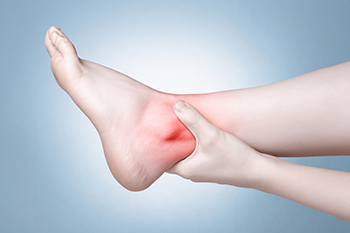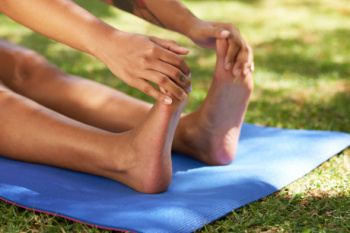March 2024
Common Symptoms of Ankle Pain

Ankle pain, a prevalent complaint among individuals of all ages and activity levels, manifests through various symptoms that can impede mobility and diminish quality of life. Among the most common indicators of ankle discomfort are localized tenderness, swelling, and stiffness around the affected joint. Individuals may experience difficulty bearing weight on the affected ankle, leading to instability and a sensation of weakness. Pain during movement, particularly when walking, running, or climbing stairs, is another prevalent symptom that often prompts individuals to seek medical attention. In some cases, ankle pain may radiate to adjacent areas such as the foot or lower leg, increasing discomfort and limiting functionality. Additionally, bruising and redness may accompany ankle pain, indicating potential injury or inflammation. Recognizing these symptoms early and addressing them promptly through appropriate interventions, such as rest, compression, and elevation can help alleviate discomfort and prevent further complications. If you have ankle pain, it is suggested that you consult a podiatrist who can determine what the cause is, and offer you treatment and relief options.
Ankle pain can be caused by a number of problems and may be potentially serious. If you have ankle pain, consult with Dr. Scott Shrem from Garden State Foot & Ankle Center. Our doctor will assess your condition and provide you with quality foot and ankle treatment.
Ankle pain is any condition that causes pain in the ankle. Due to the fact that the ankle consists of tendons, muscles, bones, and ligaments, ankle pain can come from a number of different conditions.
Causes
The most common causes of ankle pain include:
- Types of arthritis (rheumatoid, osteoarthritis, and gout)
- Ankle sprains
- Broken ankles
- Achilles tendonitis
- Achilles tendon rupture
- Stress fractures
- Bursitis
- Tarsal tunnel syndrome
- Plantar fasciitis
Symptoms
Symptoms of ankle injury vary based upon the condition. Pain may include general pain and discomfort, swelling, aching, redness, bruising, burning or stabbing sensations, and/or loss of sensation.
Diagnosis
Due to the wide variety of potential causes of ankle pain, podiatrists will utilize a number of different methods to properly diagnose ankle pain. This can include asking for personal and family medical histories and of any recent injuries. Further diagnosis may include sensation tests, a physical examination, and potentially x-rays or other imaging tests.
Treatment
Just as the range of causes varies widely, so do treatments. Some more common treatments are rest, ice packs, keeping pressure off the foot, orthotics and braces, medication for inflammation and pain, and surgery.
If you have any questions, please feel free to contact our office located in Hazlet, NJ . We offer the newest diagnostic and treatment technologies for all your foot care needs.
Foot Protection for Cold Weather Work

As temperatures plummet, the need for foot protection becomes vital for those individuals working outdoors in winter. Working in cold weather poses unique challenges, especially for your extremities, which are susceptible to frostbite and injury if not properly shielded. Robust footwear emerges as the frontline defense against the elements. Thick, insulated boots crafted from durable materials, such as leather or synthetic fabrics, offer warmth and resilience against icy terrain. Ensuring a snug yet comfortable fit prevents chafing and discomfort during prolonged exposure to the cold. Additionally, layering socks proves instrumental in maintaining optimal foot temperature, with moisture-wicking fabrics serving to keep feet dry and insulated. Incorporating moisture-absorbing insoles also enhances both comfort and warmth, reducing the risk of frostbite and related ailments. If you are suffering from foot ailments brought on by working outdoors in winter, it is suggested that you make an appointment with a podiatrist for evaluation and treatment.
While working on the feet, it is important to take the proper care of them. For more information about working on your feet, contact Dr. Scott Shrem from Garden State Foot & Ankle Center. Our doctor will treat your foot and ankle needs.
Working on Your Feet
Standing on your feet for long periods of time can cause stress and pain in your feet. Your whole body may experience change in terms of posture, back pain, bunions, callouses and or plantar warts. There are ways to avoid these conditions with proper foot care, smart choices and correct posture.
Positive Changes
Negative heeled shoe – Choosing this shoe type places the heel slightly lower than the ball of the foot. These are great for overall foot health. Find shoes that fit you correctly.
Go barefoot – Our feet were not designed to be enclosed for all hours of the day. Try to periodically expose your feet to air.
Eliminate Pain
Foot Exercises – Performing simple exercises, incorporating yoga and doing stretches are beneficial. This will allow increased blood flow to the area and muscles of the foot.
Achilles tendon – Stretching the foot out flat on the floor will relax the calf muscles and tendon. These exercises can be performed almost anywhere. Make sure you add these exercises to your daily regimen.
With a little bit of this information and knowing more about foot health, you will notice changes. Foot stretches and proper footwear will help with pain and prevent further issues.
If you have any questions please feel free to contact our office located in Hazlet, NJ . We offer the newest diagnostic and treatment technologies for all your foot and ankle needs.
Wounds That Don't Heal Need to Be Checked
Daily Foot Stretches to Ease Pain
 Incorporating stretches into your daily routine can significantly enhance the health of your feet and legs, potentially mitigating aches and the risk of injury. For example, the seated calf stretch targets the muscles at the back of your lower leg, pivotal for walking and maintaining balance. To perform this stretch, sit with your legs extended forward and a towel looped around the foot's ball. Gently pull on the towel ends, drawing your toes towards you, feeling a deliberate stretch along your calf muscles. Another beneficial stretch, the toe spread, focuses on the intrinsic muscles of your feet, which support your arches and improve toe dexterity. While seated, place your feet flat on the ground and attempt to spread your toes apart without moving your feet, holding the position to enhance muscle strength and flexibility. Bring the toes back together, and repeat this exercise several times. Lastly, the standing calf stretch is performed by placing your hands on a wall and putting one foot behind the other. Gently leaning forward while keeping the back heel on the ground stretches both the calf muscles and the Achilles tendon. If you’re experiencing pain or aches in the feet, it is suggested you make an appointment with a podiatrist to diagnose any potential problems and get more information about beneficial stretches for the feet.
Incorporating stretches into your daily routine can significantly enhance the health of your feet and legs, potentially mitigating aches and the risk of injury. For example, the seated calf stretch targets the muscles at the back of your lower leg, pivotal for walking and maintaining balance. To perform this stretch, sit with your legs extended forward and a towel looped around the foot's ball. Gently pull on the towel ends, drawing your toes towards you, feeling a deliberate stretch along your calf muscles. Another beneficial stretch, the toe spread, focuses on the intrinsic muscles of your feet, which support your arches and improve toe dexterity. While seated, place your feet flat on the ground and attempt to spread your toes apart without moving your feet, holding the position to enhance muscle strength and flexibility. Bring the toes back together, and repeat this exercise several times. Lastly, the standing calf stretch is performed by placing your hands on a wall and putting one foot behind the other. Gently leaning forward while keeping the back heel on the ground stretches both the calf muscles and the Achilles tendon. If you’re experiencing pain or aches in the feet, it is suggested you make an appointment with a podiatrist to diagnose any potential problems and get more information about beneficial stretches for the feet.
Exercising your feet regularly with the proper foot wear is a great way to prevent injuries and build strength. If you have any concerns about your feet, contact Dr. Scott Shrem from Garden State Foot & Ankle Center. Our doctor can provide the care you need to keep you pain-free and on your feet.
Exercise for Your Feet
Exercise for your feet can help you gain strength, mobility and flexibility in your feet. They say that strengthening your feet can be just as rewarding as strengthening another part of the body. Your feet are very important, and we often forget about them in our daily tasks. But it is because of our feet that are we able to get going and do what we need to. For those of us fortunate enough to not have any foot problems, it is an important gesture to take care of them to ensure good health in the long run.
Some foot health exercises can include ankle pumps, tip-toeing, toe rises, lifting off the floor doing reps and sets, and flexing the toes. It is best to speak with Our doctor to determine an appropriate regimen for your needs. Everyone’s needs and bodies are different, and the activities required to maintain strength in the feet vary from individual to individual.
Once you get into a routine of doing regular exercise, you may notice a difference in your feet and how strong they may become.
If you have any questions please feel free to contact our office located in Hazlet, NJ . We offer the newest diagnostic and treatment technologies for all your foot and ankle needs.
How Can I Tell if My Ankle Is Broken?

A broken ankle can be a painful and debilitating injury, requiring prompt attention and treatment. Recognizing the symptoms is essential for seeking appropriate medical care. One common indicator is severe pain, especially when weight-bearing or attempting to move the affected ankle. Swelling and bruising surrounding the ankle joint are also typical signs of a fracture, as the body responds to the trauma by increasing blood flow to the injured area. Additionally, deformity or misalignment of the ankle may be apparent, particularly if the fracture is severe or displaced. Limited range of motion and difficulty bearing weight on the affected ankle are further indications of a potential break. In some cases, individuals may experience numbness or tingling in the foot or toes due to nerve compression or damage. If you suspect a broken ankle, it is suggested you seek immediate medical attention from a podiatrist to prevent further damage and facilitate proper healing.
Broken ankles need immediate treatment. If you are seeking treatment, contact Dr. Scott Shrem from Garden State Foot & Ankle Center. Our doctor can provide the care you need to keep you pain-free and on your feet.
Broken Ankles
A broken ankle is experienced when a person fractures their tibia or fibula in the lower leg and ankle area. Both of these bones are attached at the bottom of the leg and combine to form what we know to be our ankle.
When a physician is referring to a break of the ankle, he or she is usually referring to a break in the area where the tibia and fibula are joined to create our ankle joint. Ankles are more prone to fractures because the ankle is an area that suffers a lot of pressure and stress. There are some obvious signs when a person experiences a fractured ankle, and the following symptoms may be present.
Symptoms of a Fractured Ankle
- Excessive pain when the area is touched or when any pressure is placed on the ankle
- Swelling around the area
- Bruising of the area
- Area appears to be deformed
If you suspect an ankle fracture, it is recommended to seek treatment as soon as possible. The sooner you have your podiatrist diagnose the fracture, the quicker you’ll be on the way towards recovery.
If you have any questions, please feel free to contact our office located in Hazlet, NJ . We offer the newest diagnostic and treatment technologies for all your foot care needs.
Blog Archives
- April 2025
- March 2025
- February 2025
- January 2025
- December 2024
- November 2024
- October 2024
- September 2024
- August 2024
- July 2024
- June 2024
- May 2024
- April 2024
- March 2024
- February 2024
- January 2024
- December 2023
- November 2023
- October 2023
- September 2023
- August 2023
- July 2023
- June 2023
- May 2023
- April 2023
- March 2023
- February 2023
- January 2023
- December 2022
- November 2022
- October 2022
- September 2022
- August 2022
- July 2022
- June 2022
- May 2022
- April 2022
- March 2022
- February 2022
- January 2022
- December 2021
- November 2021
- October 2021
- September 2021
- August 2021
- July 2021
- June 2021
- May 2021
- April 2021
- March 2021
- February 2021
- January 2021
- December 2020
- November 2020
- October 2020
- September 2020
- August 2020
- July 2020
- June 2020
- May 2020
- April 2020
- March 2020
- February 2020
- January 2020
- December 2019
- November 2019
- October 2019
- September 2019
- August 2019
- July 2019
- June 2019
- May 2019
- April 2019
- March 2019
- February 2019
- January 2019
- December 2018
- November 2018
- October 2018
- September 2018
- August 2018
- July 2018
- June 2018
- May 2018
- April 2018
- March 2018









